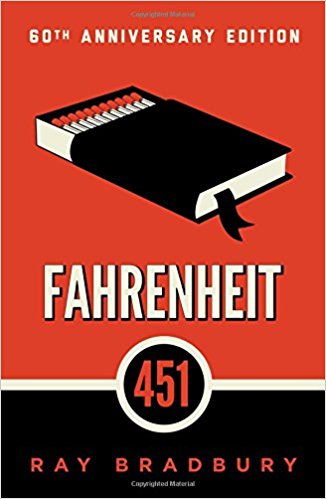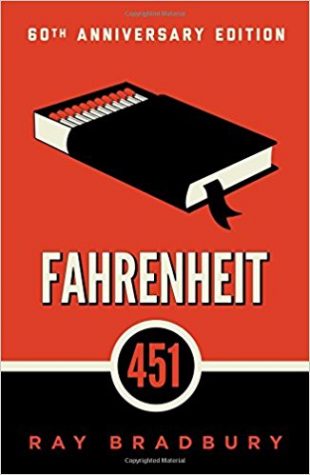Book review: Fahrenheit 451

January 23, 2018
Books are incinerated while opposition is silenced or forced into hiding in a world where citizens are captivated by TV programs during constant fear of a nuclear strike. This terrifying scenario is the basis of “Fahrenheit 451,” a book by Ray Bradbury.
Before books for teens overtook the dystopian genre, Bradbury wrote Fahrenheit 451 in 1953, a time consisting of communist witch hunts, nuclear escalation and the birth of TV. It was highly controversial at the time but has been influential enough that there are multiple movies (such as HBO’s latest attempt) about it, and intellectuals praise its themes in between their pondering over the many symbols.
The story follows Montag Guy — a fireman who burns buildings because they hold literature — and his journey to reject the status quo. He must deal with killer robots, the captain of the firemen and the societal pressure of those around him to conform. Bradbury went on record that the novel’s true meaning was how new forms of entertainment, like TVs or radios, would cause the population to become ioditic. This can be seen easily as Guy’s wife, Mildred, is infatuated with television to the point that she refers to the actors as “family” and can’t remember important moments in her life such as when she met Guy. In the book, technology dehumanizes citizens around them, as TV causes humans to blindly follow the government and people attempt to run over others just for fun while in cars.
There are also underlying themes of censorship and government interference that steal center stage during the story, to the point that they become the main selling point of the novel. The burning of books and ostracization of professors within the text is similar to how the U.S. government censored those who held beliefs of communism or question the actions that they had taken. Even today, these themes are important as governments in Iran, China and Venezuela either censor the citizens or the Internet in order to control their citizens.
The writing style isn’t fast-paced, even in scenes where every second counts. Bradbury often interjects philosophical statements during the conversation between characters or Guy’s thoughts, allowing the novel to ask interesting — though convoluted — questions throughout the journey.
The story starts by introduced new characters and environments in the first act that paint a futuristic world. This is offset however by the lack of important events, causing the story to only settle on Guy’s characterization and his environment. The absence of events early on is helpful since it gives the reader time to invest themselves in the setting and become accustomed to the many aspects.
Philosophical speeches and paranoia rule the second act, which brings down the momentum but fleshes out character development. The struggle of Guy to cope with societal pressure while pursuing his urges to read and search for peers who feel the same is saddening as it is relatable for anyone who has tried to find their place. Captain Beatty also changes from an authority figure to a true antagonist as someone who is an intellectual yet hates knowledge and has devoted their life to its destruction, the opposite of Guy who is ignorant but wishes to learn.
The third act culminates the story with breath-taking change of events that both begins and ends with an explosion. It provides satisfying conclusion to the characters of Guy and Beatty while showcasing the tragedy of the other characters that never got the chance or wouldn’t accept literature. The ending provides a cautionary message about mob mentality but promotes the human spirit and our ability to change our ways as long as they keep their history.
“Fahrenheit 451” is a strong political statement that shows the power of censorship and how humans can prevail even under the most distressing situations.Guy and Beatty are two literary figures that are difficult to forget and allow the reader to truly understand the way books’ messages can affect them. The characters provide aspects that reflect ourselves in many ways, through our attempts to chase our dreams while also attempting to fit in. 